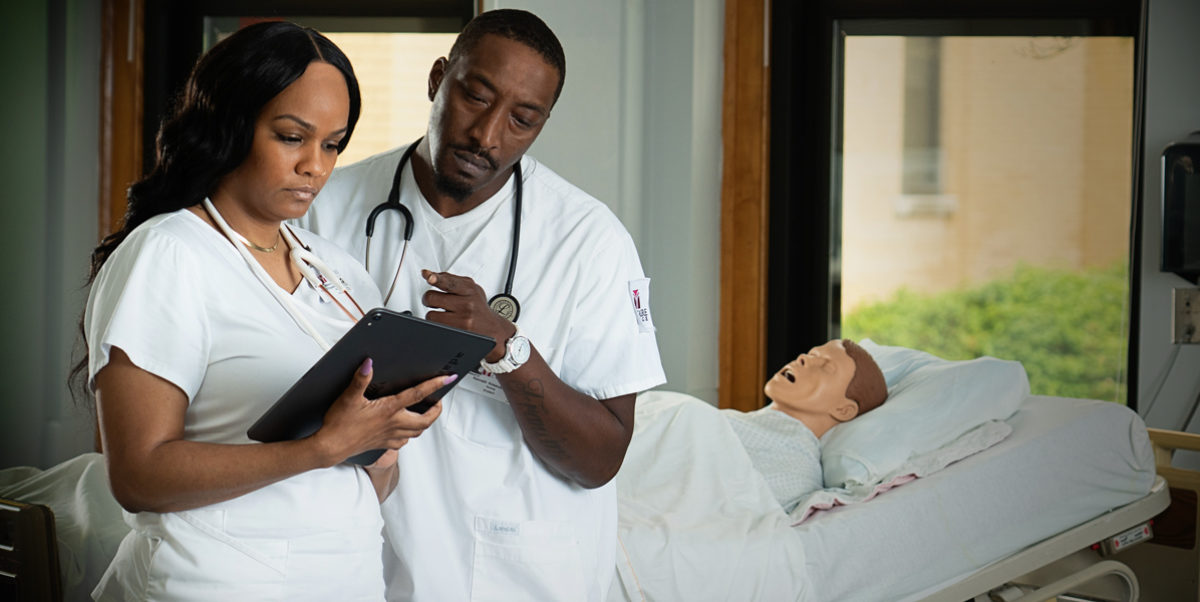Nursing



Certificate Program | Practical Nursing
The Catherine McAuley School of Nursing
Trocaire College has been educating compassionate, knowledgeable and devoted nurses to serve the greater Buffalo community for more than 50 years. Our nursing students are grounded in Mercy traditions and armed with real-world clinical experiences at hospitals and healthcare facilities all over Buffalo, where they learn how to apply their hands-on laboratory skills and complex classroom fundamentals to situations they’ll face every day as they help heal Western New Yorkers. Nursing is a calling, and backed by their challenging, comprehensive and engaging Trocaire education received in the Catherine McAuley School of Nursing, our students are empowered to answer that calling and find careers where they make a difference every single day.
Our Certificate in Practical Nursing prepares students to work as an integral part of a healthcare team in just 18 months. LPNs perform a variety of tasks and responsibilities within the framework of case finding, health teaching, and health counseling, and support patient care under the supervision of registered nurses and/or physicians. They are often employed in settings such as long-term care and rehab facilities, physician’s offices or home health care.
AAS Associate Program | Registered Nursing
The Catherine McAuley School of Nursing
Trocaire College has been educating compassionate, knowledgeable and devoted nurses to serve the greater Buffalo community for more than 50 years. Our nursing students are grounded in Mercy traditions and armed with real-world clinical experiences at hospitals and healthcare facilities all over Buffalo, where they learn how to apply their hands-on laboratory skills and complex classroom fundamentals to situations they’ll face every day as they help heal Western New Yorkers. Nursing is a calling, and backed by their challenging, comprehensive and engaging Trocaire educations received in the Catherine McAuley School of Nursing, our students are empowered to answer that calling and find careers where they make a difference every single day.
BS in Nursing – Bachelor of Science Degree with Major in Nursing (BS)
The Catherine McAuley School of Nursing
Trocaire College has been educating compassionate, knowledgeable and devoted nurses to serve the greater Buffalo community for more than 60 years. Our nursing students are grounded in Mercy traditions and armed with real-world clinical experiences at hospitals and healthcare facilities all over Buffalo, where they learn how to apply their hands-on laboratory skills and complex classroom fundamentals to situations they’ll face every day as they help heal Western New Yorkers. Nursing is a calling, and backed by their challenging, comprehensive and engaging Trocaire educations received in the Catherine McAuley School of Nursing, our students are empowered to answer that calling and find careers where they make a difference every single day.
As a bachelor’s degree-prepared nurse, you will be required to use critical reasoning and clinical judgment every day. Students will base their practice on evidence, from research and best practice standards of nursing. Additionally, you will demonstrate unwavering compassion and respect for human life. Some nurses see this as a calling to the profession of nursing. The Catherine McAuley School of Nursing program empowers students to answer that calling and find careers where they make a difference every single day.
Registered nurses looking to gain the leadership and management skills needed for advanced careers in nursing and increase their salary potential can turn to Trocaire’s Bachelor of Science Degree with a Major in Nursing (BS). We emphasize nursing expertise beyond the clinical, such as patient education, health promotion, community health, healthcare across the lifespan, and technology integration. The program is flexible and convenient for the working nurse and is available online.
PUBLIC NOTICE OF UPCOMING ACCREDITATION REVIEW VISIT BY THE ACEN
Trocaire College – Catherine McAuley School of Nursing wishes to announce that it will host a site visit for continuing accreditation of its BS in Nursing – Bachelor of Science Degree with Major in Nursing (BS) nursing program by the Accreditation Commission for Education in Nursing (ACEN).
You are invited to meet with the site visit team and share your comments about the program in person at a meeting.
The scheduled ACEN visit dates are March 10, 11 and 12, 2026. The meeting date, time and room is TBA.
Please check back for the date, time, and room of the scheduled in person meeting to be announced.
Written comments are also welcome and should be submitted to the ACEN via email at public-comments@acenursing.org or to the ACEN office:
Attn: Accreditation Services
Accreditation Commission for Education in Nursing
3390 Peachtree Rd NE, Suite 1400
Atlanta GA, 30326
All written comments should be received by the ACEN by Thursday, February 19, 2026.
*Written comments are due to the ACEN two weeks before the visit.

